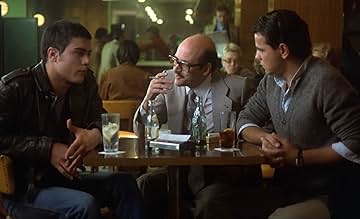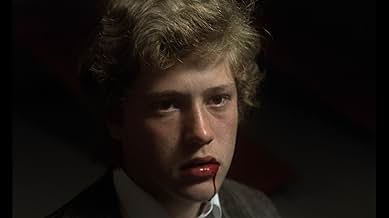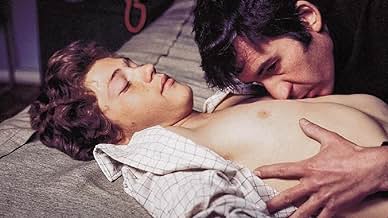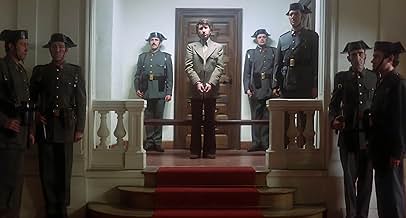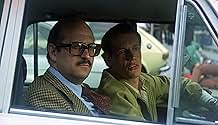Aggiungi una trama nella tua linguaForbidden love between a politician and a teenage hustler hired by secret police for blackmail. Their relationship takes an unexpected romantic turn, leading to a dangerous situation involvi... Leggi tuttoForbidden love between a politician and a teenage hustler hired by secret police for blackmail. Their relationship takes an unexpected romantic turn, leading to a dangerous situation involving betrayal and potential murder.Forbidden love between a politician and a teenage hustler hired by secret police for blackmail. Their relationship takes an unexpected romantic turn, leading to a dangerous situation involving betrayal and potential murder.
- Regia
- Sceneggiatura
- Star
- Premi
- 1 vittoria e 1 candidatura in totale
- Roberto Orbea
- (as Jose Sacristan)
- Carmen
- (as Mª Luisa San Jose)
- Juanito
- (as Jose Luis Alonso)
- Moreno Pastrana
- (as Enrique Vivo)
- Carrés
- (as Agustin Gonzalez)
- Nes
- (as Angel Pardo)
- Juan
- (as J. Antonio Bardem)
- Esposa de Eusebio
- (as Mª Angeles Acevedo)
- Policía
- (as Fernando Marin)
- Policía interrogador
- (as Ramon Reparaz)
- Anfitrión de la 1ª orgía
- (as Fabian Conde)
- Lector de la ficha policial
- (as Ramon Centenero)
- Política comunista
- (as Mª Jesus Hoyos)
Recensioni in evidenza
This is a provoking story in which politics collide with gay underworld , forbidden loves , blackmail , treason , violence and murder . Shot a bit later on the events are developed and including apparition of prestigious politicians as Adolfo Suárez , Felipe Gonzalez , Manuel Fraga Iribarne , Santiago Carrillo from the troublesome period when the known ¨Spanish Transition¨ took place . Narrated by a long flashback and voice-in-off by the same protagonist Roberto/Sacristán , though there is an excessive pamphlet tone and communist propaganda . And as trivia , to expose that Enrique Tierno Galván , President of Popular Socialist Party , PSP , had a meeting with the Communist leader Santiago Carrillo to press De La Iglesia , famous communist militant , to impede Eloy to shoot this film , due to similarity on a case happened in his own party . It displays a complex , extreme and curious screenplay by Gonzalo Goicoechea and Eloy De La Iglesia , both of them collaborated extensively on various films . Nice acting by José Sacristán as a politician who has several trysts with very young rent boys and becomes involved with nasty blackmailers . Support cast are pretty good , such as Agustin Gonzalez , Enriqué Vivó , José Manuel Cervino , and finally Queta Claver and Angel Pardo , both of whom played in ¨La Corea¨ and Pardo in the same gay role as ¨Nes¨. In addition , filmmaker Juan Antonio Bardem as a communist inmate , in fact Bardem was imprisoned during the start of filming ¨Calle Mayor¨; as student protests in Madrid , led to the arrest of Bardem, a communist, in the city of Palencia , he was jailed for a few days and released on the condition that he could not talk about his personal life or beliefs during interviews related to the film .
"Confessions of a Congressman" or "The Deputy" -International titles- was regularly directed by Eloy De La Iglesia . Most his films dealt with sex including shots of nude males , homosexuality , politics and forbidden lovers . De La Iglesia was a notorious communist militant , drug addict and homosexual , these personal characteristics were widely shown in his films . Eloy was a talented Spanish movies director , he began working in cinema in 1966 , at his 22 years old , he debuted in a kiddies production , ¨Fantasy 3¨(66) . Following a sordid melodrama ¨Algo Amargo En La Boca¨ (67) and a boxing story , ¨Cuadrilatero¨(69) . De La Iglesia realizes a lot of thrilling pictures with erotic background as ¨Techo Cristal¨(70) , ¨Nadie Oyó Gritar¨ (72) , ¨Gota Sangre Para Seguir Amando¨ (73) , and scabrous tales as ¨Juegos Amor Prohibido¨(75) , ¨Otra Alcoba¨ (76) . And concerning youthful gay : ¨Placeres Ocultos¨(76) , ¨El Sacerdote¨(78) and politicians : ¨The Deputy ¨, ¨Mujer Del Ministro¨ . Although he became notorious in the years of the Spanish transition to democracy with shocking and polemic films as ¨El Pico 1¨ and 2¨ , ¨Cólegas¨ , ¨Navajeros¨, ¨La Estanquera De Vallecas¨ (87) . All of them dealt with druggies , dope sellers , delinquency , terrorism , underworld suburban and generational problems are the habitual subjects in his films , and specially dedicated to the underworld of heroin ; as well as the gay world . Passing of time hasn't had mercy with most of those movies , but they represented a time and a way of life in the history of Spain ; and now they may seem a little bit naive . His last films were an academic rendition based on Henry James' novel : ¨The turn of the screw¨ and ¨Los Novios Búlgaros¨.
One wishes EL DIPUTADO seemed more dated today as it looks at a well meaning bisexual socialist candidate for office (and his attractive, understanding wife) in a Spain still dominated by Franco fascists using every dirty trick to hold onto power after Franco's death as the country struggled to re-establish a real democracy under King Juan-Carlos, but in vividly recalling the British landmark film, THE VICTIM, which focused on the statutes repressing gays (once rightly called "The Blackmailer's Bill of Rights"), instead it rings painfully true and even relevant.
José Sacristán as the troubled socialist Deputy, Roberto Orbea is utterly charming and holds his own in part thanks to the appropriate political charisma of María Luisa San José as his wife Carmen. One might expect the charismatic Ángel Pardo as the dangerous hustler, Nes, to be the third driving force in the film (and his scenes do sizzle), but it is the layered lost innocence of José Luis Alonso's Juanito (the street kid Orbea becomes obsessed with) on which the film and Orbea's fate turn.
In 1978, EL DIPUTADO was marketed as a "gay film," and that was probably the only way it could have been accepted then, but in more enlightened times, it stands out for any audience as an excellent examination of the hypocrisy of right wing politics, and the problems we create for good men AND women when we force them into false roles by denying them the solace and support of marriage because they love the wrong people.
The three principal actors do some really wonderful work, aided by some very good writing, as members of the love triangle--sterling examples of the "less is more" approach to acting. The viewer feels real compassion for these all-too-human characters, in stark contrast to a movie like "Making Love"--the love-triangle plot reminded me of it, albeit very superficially--which opted for caricatures over actual people.
The look of the movie is real '70's, which only adds to it's immediacy and charm.
A very entertaining movie that seems to me to be ripe for re-release on DVD.
Lo sapevi?
- QuizProvocative director Eloy de la Iglesia's El Diputado has been fully restored and is also known as Confessions of a Congressman with English Subtitles
- Citazioni
[after the hustler Juanito confesses that he's been attempting to frame the politician Roberto for the fascists by sleeping with him]
Juanito: Which do you consider the biggest lie?
Roberto Orbea: Not telling me you were fascist bait.
Juanito: No. It was telling you I was doing this just for the money.
- ConnessioniReferenced in Salvados: Sacristán: Retrato del compromiso (2016)
- Colonne sonoreCanto a la Libertad
Performed by Manuel Gerena
I più visti
- How long is Confessions of a Congressman?Powered by Alexa
Dettagli
- Data di uscita
- Paese di origine
- Sito ufficiale
- Lingua
- Celebre anche come
- Confessions of a Congressman
- Luoghi delle riprese
- Aziende produttrici
- Vedi altri crediti dell’azienda su IMDbPro
Contribuisci a questa pagina


